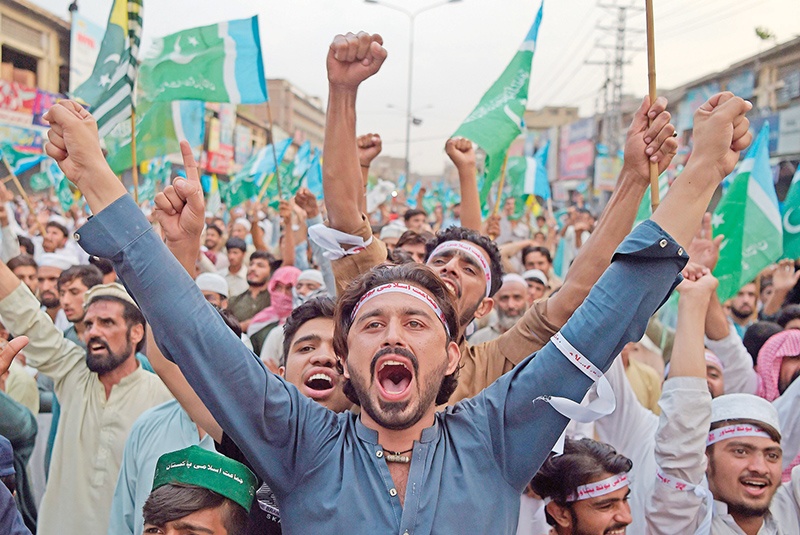
SRINAGAR: US
President Donald Trump said yesterday he had no need to help mediate between
Pakistan and India over tensions in disputed Kashmir because Prime Minister
Narendra Modi feels he has it "under control". On August 5 Modi's
Hindu-nationalist government revoked the autonomy of the Muslim-majority
territory where tens of thousands of people have been killed in an uprising
against Indian rule since 1989, most of them civilians.
Earlier this month,
Trump said he was ready to step in, but at a meeting with Modi at the G7 in
France, Trump said "the prime minister really feels he has it under
control". Trump added he and Modi spoke about Kashmir "at great
length" on Sunday. New Delhi's contentious decision angered Pakistan,
which has fought two wars with India over the region, and Prime Minister Imran
Khan said yesterday he would continue fighting for the rights of Kashmiris.
Khan said he
planned to embark on a diplomatic tour soon to raise the issue in international
forums including the UN General Assembly in September. "I will tour the
world and tell them what is happening... the Modi government is pursuing a
policy which brought havoc globally in the past," Khan said in a televised
broadcast. "Many Muslim governments, which are not openly supporting us
due to their business interests, will sooner or later support our position...
It is imperative that we should stand by Kashmiris. We should give a message to
Kashmiris that we are with them."
Truck driver
killed
The Trump-Modi
talks came as police said stone-throwing protesters in Kashmir killed a driver
of what they thought was a military truck, amid a crippling security lockdown
imposed just hours before the autonomy announcement. New Delhi sent
reinforcements to the estimated half-a-million troops already stationed in
Kashmir, cut phone lines and the internet, placed severe restrictions on
movement and arrested thousands, according to multiple sources.
The turning of
the former Himalayan kingdom of seven million people into a fortress of
barricades and barbed wire has not prevented protests and clashes with security
forces taking place however. In the latest demonstration on Sunday in Anantnag
district protestors hurled stones at a truck that they believed to be a
military vehicle. The 42-year-old driver was struck on the head and died,
police said.
The Press Trust
of India news agency said two men had been arrested over the incident. India
says no civilian has died from police action since August 5. But residents have
said three people have been killed, including a young mother who choked after
police fired tear-gas canisters into her home. Multiple hospital sources have
told AFP at least 100 people had been hurt during the lockdown, some with
firearm injuries.
Authorities say
they have been easing restrictions gradually but a delegation led by key
opposition figure Rahul Gandhi was turned away at Srinagar airport on Saturday
after flying in from New Delhi to assess the situation. Regional police chief
Dilbagh Singh told AFP Gandhi was turned back because in a situation
"getting to normalcy" they wanted to avoid any "controversial
statement". Jammu and Kashmir Governor Satya Pal Malik on Sunday defended
the restrictions, echoing the government which says the curbs are meant to
maintain peace in the disputed region also claimed by arch-rival Pakistan.
Trump offer
Ahead of his
latest remarks, Trump last Tuesday after phone calls with both Modi and Khan
offered to mediate in what he called an "explosive" situation in
Kashmir. "Kashmir is a very complicated place. You have Hindus and you
have the Muslims and I wouldn't say they get along so great," Trump told
reporters at the White House. "I will do the best I can to mediate,"
he added. India has insisted Kashmir is purely an internal matter and that it
does not want outside mediation. "Any discussion on Kashmir, if at all
warranted, will only be with Pakistan and only bilaterally," Foreign
Minister Subrahmanyam Jaishankar was quoted as saying on Friday. - AFP









